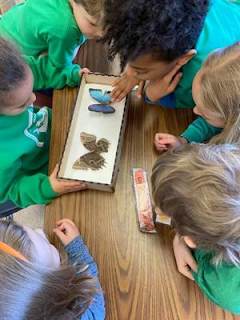(Early April 2022 in West Newsmagazine)
Back in the late 1980s and into the ‘90s, West County elementary school teacher Rachel Crandell delved deeply into what became a life’s journey. She and her late husband, Dwight, frequently traveled to Costa Rica and ultimately founded the Monteverde Conservation League. They recruited several friends on their journeys and expanded that organization into the United States.
That was merely an embryonic step toward the birth of the Ballwin-based nonprofit Friends of the Rainforest.
“Our founder, Rachel, started this organization as her own advocacy as a school teacher,” Executive Director Sophie Arp said. “She was bringing all these rainforest ideas into her classrooms and saw how much it inspired kids to want to protect the rainforest. We had kind of an unofficial education program for a while, but it wasn’t until about 2015 when we developed an official education program. We hired an official education coordinator, and it kind of grew from there.”
Ballwin Elementary working with a Friends of the Rainforest bird beaks lesson pre-pandemic. (Provided)Today, Friends of the Rainforest offers a varied curriculum and hands-on classroom lessons. The pandemic forced more take-home lessons and more online content in addition to more programs featuring hybrid lessons.
Education and Outreach Coordinator Jamie Kisela had been going to schools and dropping off needed materials; then, giving lessons virtually or offering them to the teachers. Now, many schools have returned to offering these classes in person. Generally, the lessons are for students in grades kindergarten through grade 5.
All lessons are completely free and Friends of the Rainforest works with public and private schools, home-school groups, church groups – basically any group of kids that wants to learn about the rainforest. Recently, the nonprofit was accepted into the STEM-STL program. Their long-term goal is finding ways to branch out all across the St. Louis area.
Students completing a Friends of the Rainforest lesson. (Provided)Groups can sign up under the education tab, at friendsoftherainforest.org or by contacting Jamie@friendsoftherainforest.org.
“Living in Missouri, the rainforest can feel very far away, but we’re ultimately trying to bridge that gap from middle America,” Arp explained. “Having hands-on activities helps in that way.
“One of the main messages we try to convey is just how interconnected everything is. We like to teach about the rainforest and the animals there, but kind of turn it back here in St. Louis.”
She said one question to be asked is, “What can we do here to help the animals there?”
“So, we have lessons about migratory birds. We can look at ruby-throated hummingbirds because those live in the rain forest as well,” Arp said. “Just focusing on all the different aspects of consciousness and about protecting the bees and what native plants can we plant here. Everything has an impact. Ultimately, our life on this planet depends on the rainforest.”
Ballwin Elementary students after completing a Friends of the Rainforest lesson pre-pandemic. (Provided)In addition to its local educational programs, Friends of the Rainforest promotes a larger program that also was put on hold during the pandemic – its Eco-Tours. Recently, those tours resumed for schools, church groups and whoever else wants to visit the rainforest. The trips are organized through Natural Solutions, one of the nonprofit’s partner organizations in Costa Rica. Natural Solutions is run by co-owner and guide Jeff Norris.
Arp described Norris as very knowledgeable, willing to help in all the back-end planning and open to what the visitors want to see and do. Although the tours are customizable, one of the highlights of each trip is a visit to the recently protected Children’s Eternal Rainforest (el Bosque Eterno de los Niños).
“You generally go for five days, a week or longer,” Arp said. “With school groups, we try to emphasize field and scientific studies that are already going on in the rainforest. Kids can come up with their own questions and a variety of ways to study things there.”
The goal is to make a lasting impact on the visitor.
“That always works because it’s so beautiful with the richness of the biodiversity and having so many plants so condensed into a relatively small space,” Arp said. “It’s just so dense with life that it’s incredible!”
Currently, the eco-tourism program is only available to those schools and families that can afford to go to Costa Rica. But Arp said the foundation is working hard to develop a scholarship program to help reach kids and families in lower income brackets to connect them to the rainforest, too.
Students examining a butterfly box from Friends of the Rainforest. (Provided)Kisela is always working to make the nonprofit’s education programming more accessible. During the pandemic, one of the larger educational programs she developed was Friends’ take-home butterfly mounting kit, which was offered through a partnership with the Sophia M. Sachs Butterfly House in Chesterfield.
On Friday, April 22, Friends of the Rainforest will furnish several virtual videos live from Costa Rica. These Earth Day lessons will be led by Lindsay Stallcup, one of the organization’s executive directors, who currently resides in Monteverde.
Locally, this year’s Earth Day celebration will encompass the entire weekend. The international theme is “Invest in Our Planet.” Friends of the Rainforest will have a booth set up on April 23 and 24 at the Earth Day 365 festival, which will be held from 11 a.m.-5 p.m. near the Muny in Forest Park.
The nonprofit will also be at the Sophia M. Sachs Butterfly House for the entire week leading up to Earth Day, celebrating Environmental Education Week. Additionally, kids and families can sign up online for Pollinator Fair Days to be held on April 23 and 24 from 10 a.m.-4 p.m. at the Butterfly House in Faust Park.




No comments:
Post a Comment